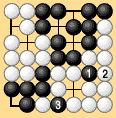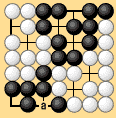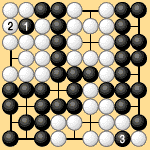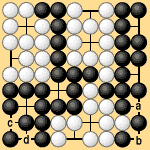 |
 |
| Dia. 3-3-1 | Dia. 3-3-2 |
|---|
|
| After Black 3 takes the ko in Dia. 3-3-1, White has not even one ko threat, so White 4 passes. Black cannot afford to connect this ko so he also passes, leaving Dia. 3-3-2. If that is the end of the game, then the black group on the lower side is alive. It cannot be removed even though it has what in Japan would be considered a false eye at 'a' that should cause it to be dead. |
 |
 |
| Dia. 3-3-1 | Dia. 3-3-2 |
|---|
|
If moves that recreate a former position are allowed after two consecutive passes, then White can recapture at 'a' and Black dies. This is why some people propose to end the game with three passes. The essential point is not that the game ends with three passes, but that moves that recreate former positions are allowed after two passes. This is where the problem lies. In Dia. 3-3-3, after Black 3 takes the ko White has no ko threats. Black is not going to connect at 'a' in Dia. 3-3-4, because then White could recapture at 'b' and Black would have no ko threats. After Black 3, accordingly, White and Black both pass and the game ends. |
 |
 |
| Dia. 3-3-3 | Dia. 3-3-4 |
|---|
|
Under area rules there is no logical contradiction in ending the game as in Dia. 3-3-4, but there is a problem about the points 'a' and 'b.' Under area rules that are concerned only with stones (area rules I) 'a' and 'b' do not count, and Black cannot occupy 'c' or 'd' either without losing the stone to the left of 'b.' Under area rules that count both stones and eyes (area rules II or III), 'a' to 'd' all count for Black. Note that this difference between the two types of area rules is not ascribable to the cutting bonus. If exceptions to the rule forbidding recreation of the same position are allowed after two consecutive passes, then after two passes White can recapture at 'b.' Accordingly, Black will connect at 'a,' White will capture at 'b,' Black will play at 'd,' and White will connect the ko. So we are faced with the problem of whether to make an exception to the super-ko rule after a pass. This is an important issue in settling problems that might arise at the end of the game under both traditional rules and new rules. The issue is also important in answering rules theorists who propose to end the game with three passes. |